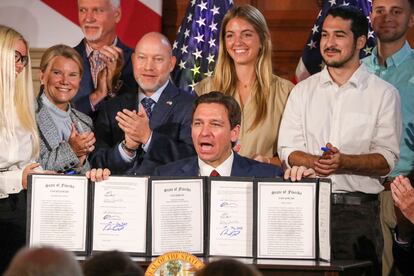DeSantis curtails diversity, equity and inclusion programs in Florida state colleges
The latest move builds on the governor’s larger push to shape Florida’s education system through regulating how schools deal with subjects such as race and gender

Florida Governor Ron DeSantis on Monday signed a bill that blocks public colleges from using federal or state funding on diversity programs, addressing a concern of conservatives ahead of the Republican governor’s expected presidential candidacy. The law, which DeSantis proposed earlier this year, comes as Republicans across the country target programs on diversity, equity and inclusion in higher education.
The signing builds on the governor’s larger push to shape Florida’s education system through regulating how schools deal with subjects such as race and gender, with DeSantis arguing that he is challenging inappropriate liberal ideology in the classroom.
DeSantis, who is expected to announce his presidential run in the coming weeks, has focused heavily on divisive cultural issues as he moves to win over the conservative voters who typically decide Republican primary elections.
Diversity, equity and inclusion offices in higher education often spearhead services tailored to students of various races, genders, sexual orientations, cultures and abilities. Some college administrators also consider so-called DEI factors when admitting students, providing scholarships or deciding which faculty to hire and promote.
The law blocks public universities from diverting state or federal funds toward programs or campus activities that advocate for diversity, equity and inclusion or promote political or social activism.
“In reality, what this concept of DEI has been is to attempt to impose orthodoxy on the university,” DeSantis said at a bill signing ceremony in Sarasota. “This has basically been used as a veneer to impose an ideological agenda, and that is wrong.”
The measure also bars curriculums that teach “identity politics” or “theories that systemic racism, sexism, oppression, and privilege are inherent in the institutions of the United States and were created to maintain social, political, and economic inequities.” The provision is aimed at curtailing education about critical race theory, a way of thinking about U.S. history through the lens of racism.
In a signal of DeSantis’ reach on education, he chose to sign the bill at New College of Florida, a small, traditionally-progressive school that became nationally known this year after the governor appointed a group of conservatives to its board of trustees. Among the DeSantis appointees’ first moves was to eliminate the New College’s diversity, equity and inclusion office.
The takeover has led to pushback among students at New College, long known for its progressive thought and creative course offerings that don’t use traditional grades.
On Monday, a small group of protestors gathered outside the signing ceremony. DeSantis, as well as most of the speakers at the event, ridiculed them.
“You know, I saw some of the protestors out there. I was a little disappointed. I was hoping for more,” DeSantis said with a smile as his supporters clapped.
Sen. Shevrin Jones, a Democrat, issued a statement after the signing that said the law continues DeSantis’ “overreach” into education.
“Education ought to be about teaching kids how to think through issues, not what to think about issues,” Jones said. “The exposure to wide-ranging experiences and fresh perspectives encourages understanding and creativity. By restricting what students can learn, the state is actively suppressing students’ academic and intellectual freedom.”
Sign up for our weekly newsletter to get more English-language news coverage from EL PAÍS USA Edition
Tu suscripción se está usando en otro dispositivo
¿Quieres añadir otro usuario a tu suscripción?
Si continúas leyendo en este dispositivo, no se podrá leer en el otro.
FlechaTu suscripción se está usando en otro dispositivo y solo puedes acceder a EL PAÍS desde un dispositivo a la vez.
Si quieres compartir tu cuenta, cambia tu suscripción a la modalidad Premium, así podrás añadir otro usuario. Cada uno accederá con su propia cuenta de email, lo que os permitirá personalizar vuestra experiencia en EL PAÍS.
¿Tienes una suscripción de empresa? Accede aquí para contratar más cuentas.
En el caso de no saber quién está usando tu cuenta, te recomendamos cambiar tu contraseña aquí.
Si decides continuar compartiendo tu cuenta, este mensaje se mostrará en tu dispositivo y en el de la otra persona que está usando tu cuenta de forma indefinida, afectando a tu experiencia de lectura. Puedes consultar aquí los términos y condiciones de la suscripción digital.








































